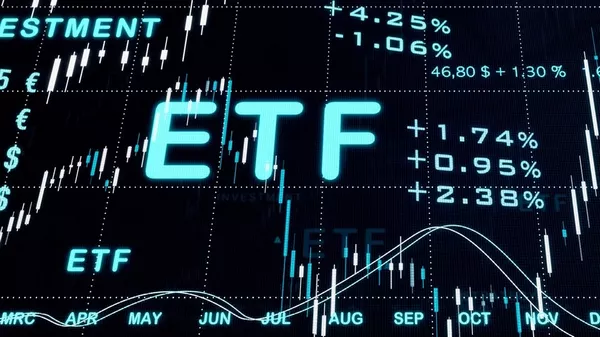In today’s fast-paced financial landscape, exchange-traded funds (ETFs) have emerged as a popular investment option. Whether you’re a seasoned investor or just starting, understanding what ETF stands for and how it operates can be the key to unlocking a world of investment opportunities. In this article, we’ll delve into the intricacies of ETFs, deciphering their meaning and shedding light on their unique characteristics.
I. Decoding ETF: Unraveling the Acronym
ETF stands for Exchange-Traded Fund. An ETF is a type of investment fund that is traded on stock exchanges, similar to individual stocks. It brings together the best aspects of both mutual funds and stocks, offering investors a diversified portfolio with the convenience of buying and selling shares throughout the trading day. The core principle behind ETFs is to provide broad exposure to various asset classes, sectors, or regions, allowing investors to participate in the growth potential of the underlying assets.
II. The Advantages of ETFs: Why They’re Gaining Popularity
Diversification:
ETFs provide instant diversification by pooling together multiple assets, such as stocks, bonds, or commodities, in a single investment vehicle. This diversification helps reduce the risk associated with investing in individual securities.
Liquidity and Flexibility:
ETFs trade on stock exchanges like individual stocks, enabling investors to buy or sell shares throughout the trading day at market prices. This feature offers flexibility and liquidity compared to traditional mutual funds, which are typically bought or sold at the end-of-day net asset value (NAV).
Transparency:
ETFs disclose their holdings on a daily basis, allowing investors to see exactly what assets they own. This transparency helps investors make informed decisions and manage their portfolios more effectively.
Cost-Effectiveness:
ETFs generally have lower expense ratios compared to actively managed mutual funds. Since most ETFs passively track an index, they have lower management fees, resulting in potentially higher returns for investors.
Tax Efficiency:
ETFs are structured in a way that minimizes capital gains distributions. When investors buy or sell shares of an ETF, they generally do not trigger taxable events for other ETF shareholders. This tax efficiency can help investors keep more of their investment returns.
III. Types of ETFs: A World of Investment Opportunities
Equity ETFs:
These ETFs invest in stocks and aim to replicate the performance of a specific index, such as the S&P 500 or Nasdaq. Equity ETFs offer exposure to various market segments, including broad market indices, industry sectors, or specific countries.
Bond ETFs:
Bond ETFs provide exposure to fixed-income securities, such as government bonds, corporate bonds, or municipal bonds. They offer investors the opportunity to diversify their portfolios and potentially earn income through regular interest payments.
Commodity ETFs:
Commodity ETFs track the performance of commodities like gold, silver, oil, or agricultural products. They enable investors to gain exposure to these physical assets without the need for direct ownership or physical storage.
Sector ETFs:
Sector ETFs focus on specific sectors of the economy, such as technology, healthcare, or energy. These ETFs provide investors with targeted exposure to industries they believe will outperform the broader market.
International ETFs:
International ETFs allow investors to access foreign markets and diversify their portfolios globally. They provide exposure to international stocks, bonds, or a specific country’s market.
IV. Risks and Considerations
While ETFs offer numerous advantages, it’s essential to understand the potential risks involved in investing in them. Here are some key considerations:
Market Volatility:
Like any investment, ETFs are subject to market fluctuations and volatility. The value of an ETF can go up or down based on the performance of the underlying assets. It’s crucial to assess your risk tolerance and investment goals before investing in ETFs.
Tracking Error:
Although ETFs aim to replicate the performance of a specific index, there can be slight discrepancies between the ETF’s returns and the index it tracks. This tracking error can be caused by factors such as fees, trading costs, and the ETF’s replication methodology. It’s advisable to research the ETF’s tracking history before investing.
Liquidity Risk:
While most ETFs are highly liquid, some niche or less popular ETFs may experience lower trading volumes, resulting in wider bid-ask spreads and potentially affecting the ease of buying or selling shares. Investors should consider the liquidity of an ETF and its underlying assets.
Expense Ratios:
While ETFs generally have lower expense ratios compared to actively managed mutual funds, it’s important to review the fees associated with an ETF. Higher expense ratios can eat into your investment returns over time.
Market and Sector Risks:
Different ETFs focus on various market segments and sectors, which come with their own risks. For example, sector ETFs may be more susceptible to economic shifts or regulatory changes affecting that particular industry. It’s essential to understand the specific risks associated with the ETFs you’re considering.
Conclusion
ETFs have revolutionized the investment landscape, offering individuals a diversified and flexible way to invest in a wide range of assets. Understanding what ETF stands for and the advantages they offer can empower investors to make informed decisions and build well-rounded portfolios. However, it’s crucial to evaluate the risks and considerations associated with ETFs before diving in. With the right research and careful consideration, ETFs can be a valuable addition to any investor’s toolkit, unlocking opportunities for growth, diversification, and long-term financial success.


